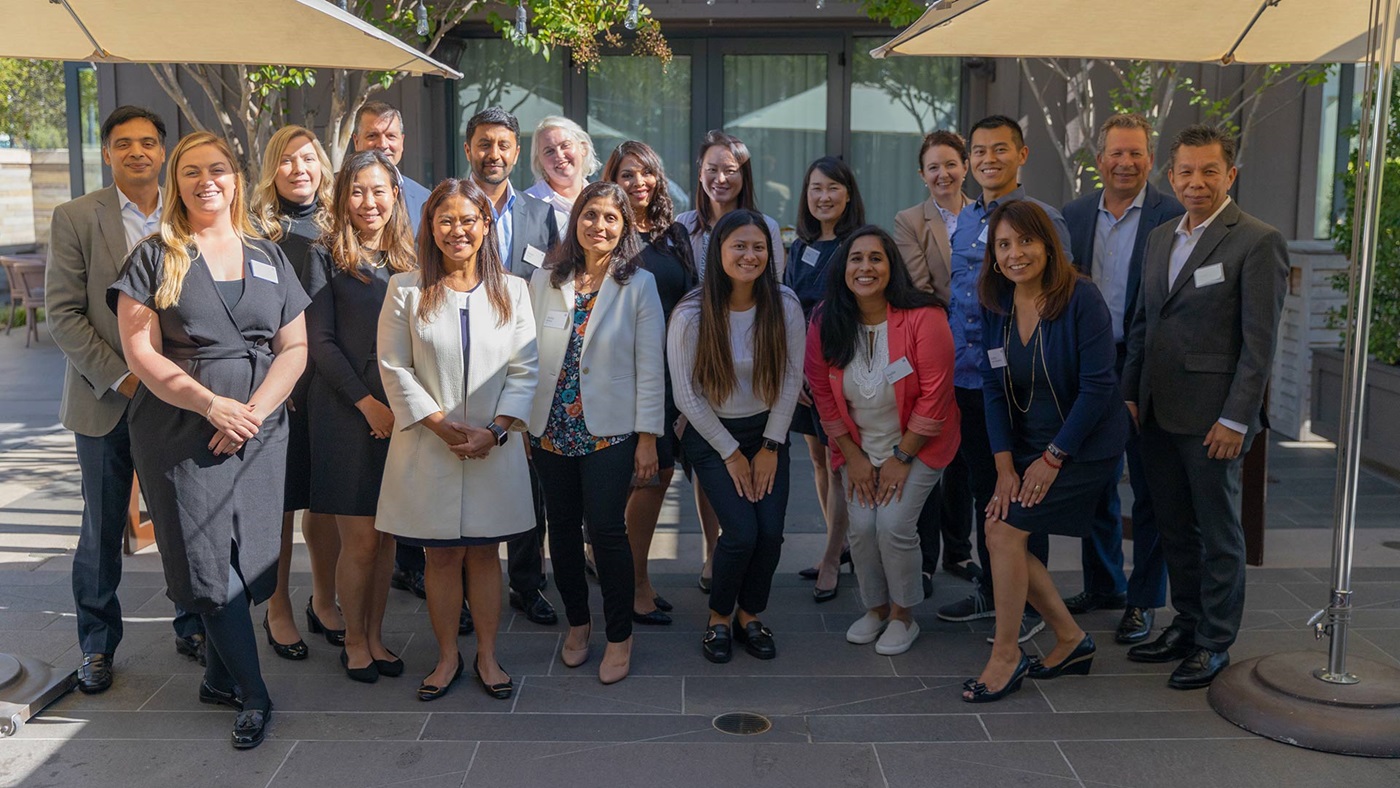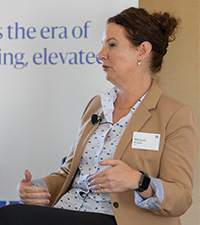

Watch video
In an intimate workshop discussion hosted by Treasury Today Group and Allspring Global Investments, treasury experts from Google, Meta and the Bay Area community, discussed the importance of culture, networking and creativity in driving treasury success.
“Even the best-designed strategic plan will flounder without a strong culture supporting it,” said Yeng Butler, Head of Investment Solutions and Liquidity Client Group at Allspring Global Investments, speaking in the opening session of a forum to support networking and best practice for the Future Treasurer, hosted by Treasury Today Group and Allspring Global Investments in Silicon Valley.
In conversation with Treasury Today’s Sophie Jackson, Publisher & Head of Strategic Content, Yeng recalled how Peter Drucker’s famous quote that ‘culture eats strategy for breakfast’ particularly resonated during the 2021 acquisition of Allspring Global Investments, formerly Wells Fargo Asset Management, by current owners GTCR and Reverence Capital Partners.
 “Our culture was really put to the test during the sale process,” said Yeng, closely involved in the deal as Wells Fargo Asset Management’s Head of Liquidity Client Group at the time. “It was the pandemic and a very challenging time to sell a company given the remote environment. It’s hard to translate how well you collaborate as a management team by Zoom, but we found a way to ensure our buyers knew this management team truly did collaborate, and we ended up with two sponsors who own the majority of the company today.”
“Our culture was really put to the test during the sale process,” said Yeng, closely involved in the deal as Wells Fargo Asset Management’s Head of Liquidity Client Group at the time. “It was the pandemic and a very challenging time to sell a company given the remote environment. It’s hard to translate how well you collaborate as a management team by Zoom, but we found a way to ensure our buyers knew this management team truly did collaborate, and we ended up with two sponsors who own the majority of the company today.”
That culture is now more important than ever. It is one of the most important factors in determining the experience as a client and employee. In today’s crowded market, culture has become a key differentiator and consideration, she told attendees. “It is about how we partner and collaborate with our clients in a different way,” said Yeng, whose 25-year career spans earlier roles at State Street Global Advisors and Merrill Lynch. “Our culture reflects our mission to elevate investing to be worth more.”
Yeng and Sophie discussed how corporate treasury is also defined by its strong culture. Treasury is renowned for its strong community, and a collaborative and sharing work ethic that is essential in complex and strategic treasury roles. “The treasury community is known for giving the time and energy to help others,” said Yeng.
 At Allspring Global Investments, the same collaborative culture and vision for elevating the industry has most recently manifest in an initiative to help foster new entrants coming into the world of corporate treasury and investment for the first time. The asset manager is launching a scheme called Allspring U that aims to support key treasury skills. “Let’s say a company has a new hire looking to make an impact as quickly as possible,” she said. “In a two-day event, Allspring U will support candidates to lean into the investment process, providing expertise from MMFs to credit analysis in a crash course so candidates can hit the ground running.”
At Allspring Global Investments, the same collaborative culture and vision for elevating the industry has most recently manifest in an initiative to help foster new entrants coming into the world of corporate treasury and investment for the first time. The asset manager is launching a scheme called Allspring U that aims to support key treasury skills. “Let’s say a company has a new hire looking to make an impact as quickly as possible,” she said. “In a two-day event, Allspring U will support candidates to lean into the investment process, providing expertise from MMFs to credit analysis in a crash course so candidates can hit the ground running.”
In addition to technical content, Allspring U offers candidates the chance to hone leadership skills. The scheme, only open to a small number of candidates to ensure a truly nurturing environment, begins with a pilot project this December with the aim of rolling it out next year.
Skills
Treasury skills are increasingly wide ranging and complex, agreed fellow panellist Nichole Krause, Director, Treasury Operations at Meta. Treasury demands strategic thinking and people able to build strong relationships across the different divisions of a business. “Everything treasury does touches another department. Treasury is increasingly about serving the rest of company,” she said. Indeed, it was this ambition to connect to the different corners of a large and sprawling business that drew Nichole to join Meta, leaving the San Francisco-based start-up, Zendesk, where she had developed the treasury function from scratch. “I wasn’t really ready to move, but when the opportunity to join Meta came up, I was drawn to the idea of being part of a team in a company operating on such a big scale.”
 Nichole explained how her career had begun in accounting in the banking sector. Later she completed an MBA, and then in a career pivot, took up a consulting role. A move that helped build skills and put her in front of different companies. Finally, she landed in corporate treasury, driven by an ambition to get back into being part of a corporation. Success in treasury requires an ability to work with others, clear communication that is easy to understand, listening and coming up with solutions, she told attendees.
Nichole explained how her career had begun in accounting in the banking sector. Later she completed an MBA, and then in a career pivot, took up a consulting role. A move that helped build skills and put her in front of different companies. Finally, she landed in corporate treasury, driven by an ambition to get back into being part of a corporation. Success in treasury requires an ability to work with others, clear communication that is easy to understand, listening and coming up with solutions, she told attendees.
Most of all, treasury requires strategic thinking. This means bringing different insights and perspectives together and working with new technology. “Strategic treasury is about creating a treasury organisation that is driven off technology that allows the team to add value,” she said.
Fellow panellist Kenny Tse, Head of Treasury Technology at Google shared insights into culture at Google. Failure is seen as part of a vital creative process in an approach that extends into treasury along with every other corner of the business. “We give people a chance to do things that others have not done,” he said. “They might fail, but it could also be the next, most amazing thing: we allow people to fail fast – others play it safe.” Kenny said a culture and belief in the company’s ability to change the world is deeply engrained in Google’s DNA. “We are not just striving for best practice. We are also wanting to develop the next best practice, go above and beyond what others have tried. Without trying we would not have learnt.”
Intellectual curiosity
 Panellists all shared their belief that treasury requires intellectual curiosity and a desire to share the pain points of a business. Nichole articulated the importance of treasury not being too hasty to come up with solutions, but asking the right questions, and listening first. “Often, it is about understanding that you don’t have the right answer,” she said. “It’s about asking for help to understand the problem better.” She also shared her belief in the importance of going slow to go fast. She came into the role at Meta tasked with big projects; all her instincts told her to jump in and come up with solutions. However, only by slowing down and understanding the problem could she take effective action. Panellists also discussed how treasury requires a growth mindset, and an acknowledgement that what we know today may not be relevant for the future.
Panellists all shared their belief that treasury requires intellectual curiosity and a desire to share the pain points of a business. Nichole articulated the importance of treasury not being too hasty to come up with solutions, but asking the right questions, and listening first. “Often, it is about understanding that you don’t have the right answer,” she said. “It’s about asking for help to understand the problem better.” She also shared her belief in the importance of going slow to go fast. She came into the role at Meta tasked with big projects; all her instincts told her to jump in and come up with solutions. However, only by slowing down and understanding the problem could she take effective action. Panellists also discussed how treasury requires a growth mindset, and an acknowledgement that what we know today may not be relevant for the future.
Network
Nichole stressed the importance of building a network. Having joined Meta during the pandemic, only now is she meeting team members face-to-face for the first time. “My past three roles came about because of my network,” she said. “It’s not lost on me how important it is to nurture your network. Reach out and help others; check in and get energy from another place.” Treasury also offers an important network to people who are shy and quiet, added Kenny. Speaking from personal experience, he said he’d learnt to lean-in and grow from his network. “It doesn’t have to be super large, but we are nothing without our community,” he said.

Reverse mentoring
Panellists also discussed the importance of sponsorship – particularly its distinction to mentorship. Sponsorship, they articulated, involves someone “going into bat for you” to help you get to the next level. The conversation also touched on the idea of reverse mentoring whereby senior leaders are mentored by a more junior colleague. Nichole’s reverse mentoring anecdote came courtesy of memories of her young son. “Despite always being told ‘no’, he kept asking – it didn’t’ stop him,” she said. “I love this idea, if I hear no I ask again later and maybe I’ll get a different answer. It’s about not being afraid of ‘no’. It’s a ‘no’ now, but it may not be a ‘no’ in future.”